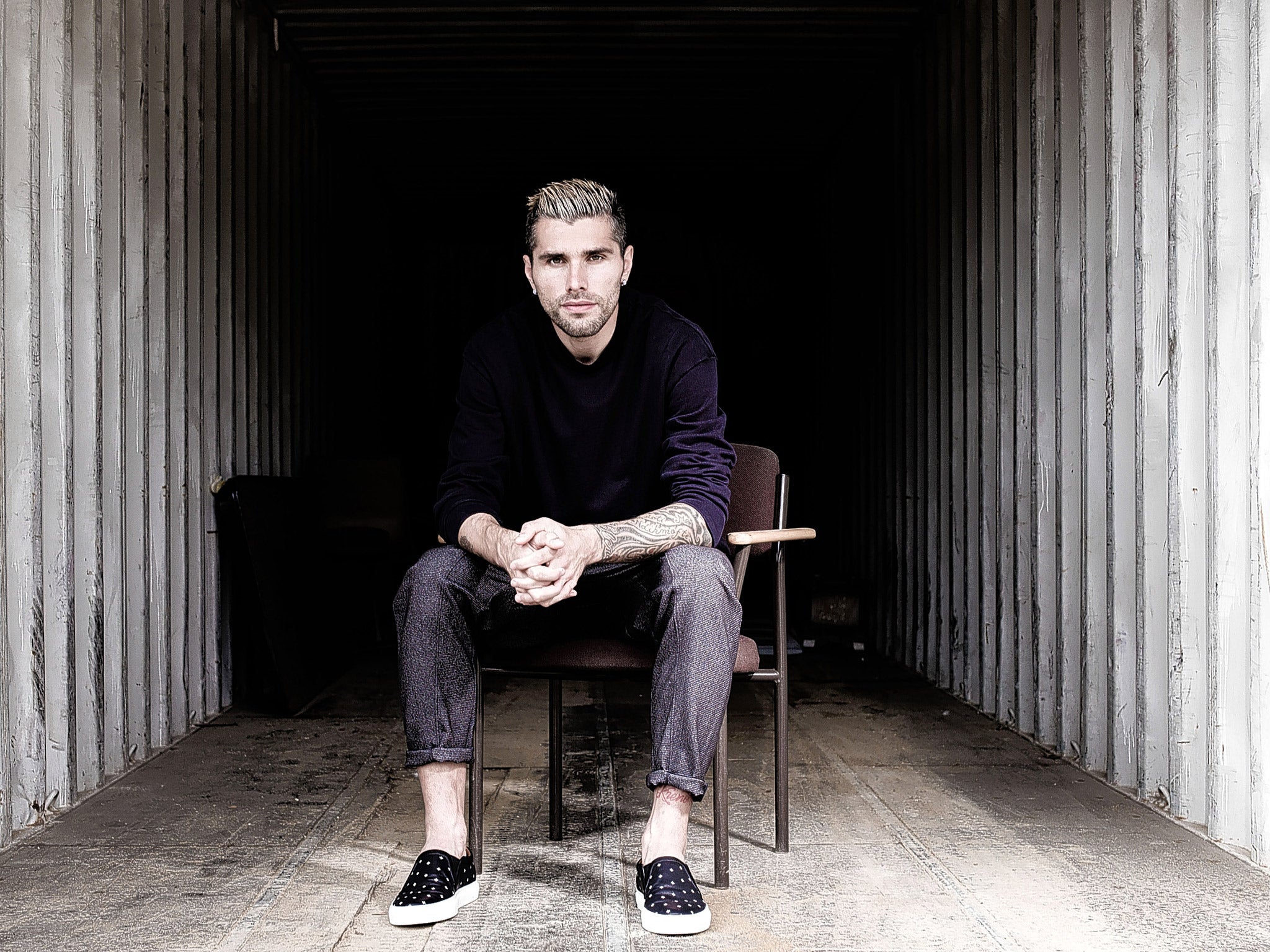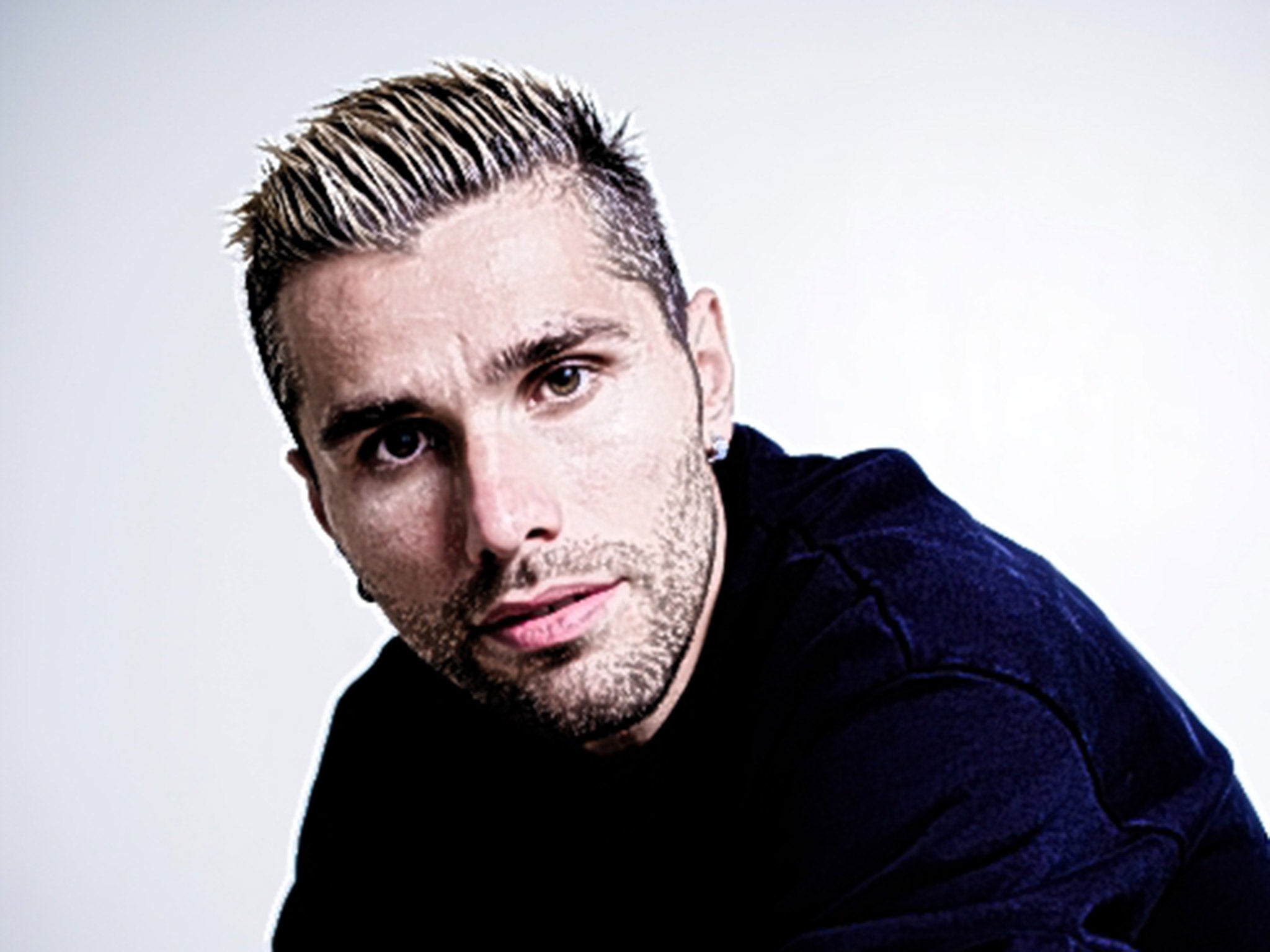Refugee crisis: Watford midfielder Valon Behrami appeals for sympathy with migrants
Watford midfielder knows what it is like to cross the continent seeking a safer future as his family fled Kosovo for Switzerland in 1990 as ethnic tensions grew. He tells Jack Pitt-Brooke about the horrors of that time – and asks for sympathy for those pouring out of Syria today

It was 1990 when the Behrami family knew they had to leave home. Ragip, who ran a plastics company, and Halime, a secretary, had been driven out of their jobs by ethnic tensions. Mitrovice, their home town, was desperately divided between Kosovan Albanians, to the south of the Ibar river, and the ethnic Serbs to the north. So they took their daughter Valentina and five-year-old son Valon, and left.
Twenty-five years on, Valon Behrami looks back at the decision that saved his family with the honesty of a man who knows that, for all his hard work, he is one of the lucky ones. With thousands of people fleeing war in Syria this year, Behrami understands their plight, and knows the importance of a helping hand.
“It started from little things, from the problem between Serbian people and Kosovan people,” Behrami remembers. “One day my parents decided there was no future there. We decided to leave, and try to go somewhere where there was a job.”
One cold December night, the Behrami family took the long bus journey to Switzerland, where they were put in temporary accommodation before settling in Stabio, on the Swiss/Italian border. “The first three months were very difficult,” Behrami adds. “We saw our parents crying, so me and my sister started to cry as well. We were crying every day.”
Eventually the Behrami family settled into Swiss life, the parents finding jobs and Valon discovering his love for running and then football. Local support helped the family to stay in the country, rather than being forced to return to Kosovo, in 1996. Seven years later Valon was playing professionally in Italy. He has since gone on to adopt the Swiss national side and play in Germany and England, where he is now at Watford. Tomorrow he will return from a three-game ban to face Arsenal at Vicarage Road.
Life is comfortable for Behrami now, as an experienced Premier League footballer. He lives with his girlfriend and daughter in St John’s Wood, north-west London, and he has bought new homes for his Kosovan relatives in the capital, Pristina. But he knows better than anyone how fortunate he was to leave when he did. He knows what might have happened to him and his family had they stayed.

“The most difficult moment was when the Kosovo War really started in 1998,” Behrami says when we meet at Watford’s training ground. “Our grandparents, uncles – my dad has nine brothers – and cousins were still there in Kosovo. They could not stay in Mitrovice, so one night they escaped to the mountains where no one could see them, for two or three months. They were moving all the time, trying to get the boat to Albania or Macedonia.”
Behrami was 13 years old, living in safety in Switzerland, watching the news on television, with barely any idea about the fate of his relatives. “Every few months someone would tell us where they were,” he says. “They explained to us how it was, they would stay somewhere for a few nights. Sometimes they would hear the noise of the rockets, they didn’t know where they were going to land, they would just listen and pray.”
We slept on the first floor. There was still the smell of burning
One of Behrami’s cousins, Bekim, was killed by the Serbs. “Forty thousand people got killed in Kosovo in the war,” Behrami reflects. Given how Bekim was killed, Behrami says it was “really tough” for his parents to explain it to him, and that those who witnessed his death are still troubled by it.
It was only after returning to Kosovo for a visit, following the Nato intervention, that the nature of what had happened struck the teenage Behrami. “When I came back after the war, I realised what happened,” he says. “Everything was destroyed.”
The Behrami family tried to stay in their old home in Mitrovice but Nato troops would not allow them. It was too dangerous, too close to the contested bridge which separates the Serbian from the Kosovan areas. “We just had to find a house and sleep there,” Behrami says. “We found a house where the second floor was just a big hole, from a bomb. So we just slept on the first floor. There was still the smell of burning upstairs.”
When the Behrami family visited Drenica, where Valon’s father Ragip is from, they found everything was “destroyed”, with gun posts still in every wall. “To see the situation from every city in Kosovo, it makes me realise what really happened.”
Behrami, his parents and sister escaped what happened through the compassion of Switzerland, where there is now a Kosovan community of 200,000 people. When the Behrami family moved in 1990 it was as part of a scheme where the Swiss government gave loans to migrant families to set them up, which were slowly repaid once the family was in work. Jobs, an apartment and a school were found for the family.
I understand these people. I understand their every situation, and how desperate they are.
Five years after arriving, the Behrami family were due to return to Kosovo. Behrami was well known in the area for his sporting prowess, and his athletics club organised a petition on his behalf. That helped to keep him in the country, but the crucial moment was when an 11-year-old Valon was playing football with the son of a local politician, whom Ragip Behrami was sat next to in the stand. Ragip explained the family’s situation, the politician kept them in the country. “It was a crazy moment, but sometimes life changes so quickly,” reflects Behrami. “He changed my life.”
Behrami understands what is at stake, and is touched more than most, when he sees footage of refugee families crossing Europe, pursuing a safe and secure future.
“When you have not been in this situation, you just think about it for maybe 20 seconds, you don’t stop yourself, think a little deeper about the situation,” Behrami says. “I understand these people. I understand their every situation, and how desperate they are. Some people just judge so quickly. They need to think a little deeper about the situation.”
When the Behramis left Kosovo, the war had not yet begun, and he makes clear that it was not as bad as Syria is now. But he has been through enough to understand the obligations the strong have to the weak. “I hope every country in Europe can help,” he says, “and do everything to help these people.
We need to be more sensitive in every kind of situation. Everyone, just be less selfish.
“We need to be more sensitive in every kind of situation. Everyone, just be less selfish. I hear on television, ‘What do they want?’ That is not the way we should treat these people. If these people really need help, everyone should open their doors and give them help.”
That is what Switzerland did with the Behrami family, which is why he chose to represent their national team, rather than Albania. He has 61 caps and will probably be at Euro 2016 next summer, his fifth tournament. “It was the best solution,” he says. “I am really happy and proud to be part of the Swiss national team, to give Switzerland back something for the opportunity they gave to my family.”
Behrami still feels a responsibility to football in Kosovo, which is why he has pushed for the creation of a national team. In 2012 Behrami, along with fellow Swiss players of Kosovo-Albanian descent Xherdan Shaqiri and Granit Xhaka, wrote to Fifa demanding it recognise the emerging team, who can still only play friendlies. Last Saturday Kosovo hosted Equatorial Guinea, and won 2-0.
68
Behrami's number of appearances in England – 63 for West Ham and five for new club Watford
“We could not help on the pitch, but in a different way,” Behrami says. “The kids there want an ambition. So if you have a national team, kids are going to wake up and say their dream is to play there.” Behrami has set up a football school in Pristina and last time he was there he met Kosovan Development Minister, Blerand Stavileci, to discuss the growth of the game, and the road to full status.
Kosovo will not play at Euro 2016, but their flag will be there, intertwined with the Swiss flag, tattooed on Behrami’s left arm. “Every time I do a tattoo it has to be for some reason,” he says. “I wanted to show I am committed to both. One side because all my family are from there, the other because Switzerland made me, because of them I am here today.”
My other life
Since I left Italy for Hamburg, I wanted to come back to England. I feel better here, even if I am away from home. The way the people live football here, I like it. I speak five languages so it is easy for me at Watford, I can jump in every discussion. I speak Italian, German, French, English and Albanian. No one at Watford speaks Albanian, but lots of people in London do. I live with my girlfriend and daughter in St John’s Wood, near Regent’s Park, a very nice area. And lots of Albanian people in the street recognise me and talk to me.
Join our commenting forum
Join thought-provoking conversations, follow other Independent readers and see their replies
Comments
Bookmark popover
Removed from bookmarks